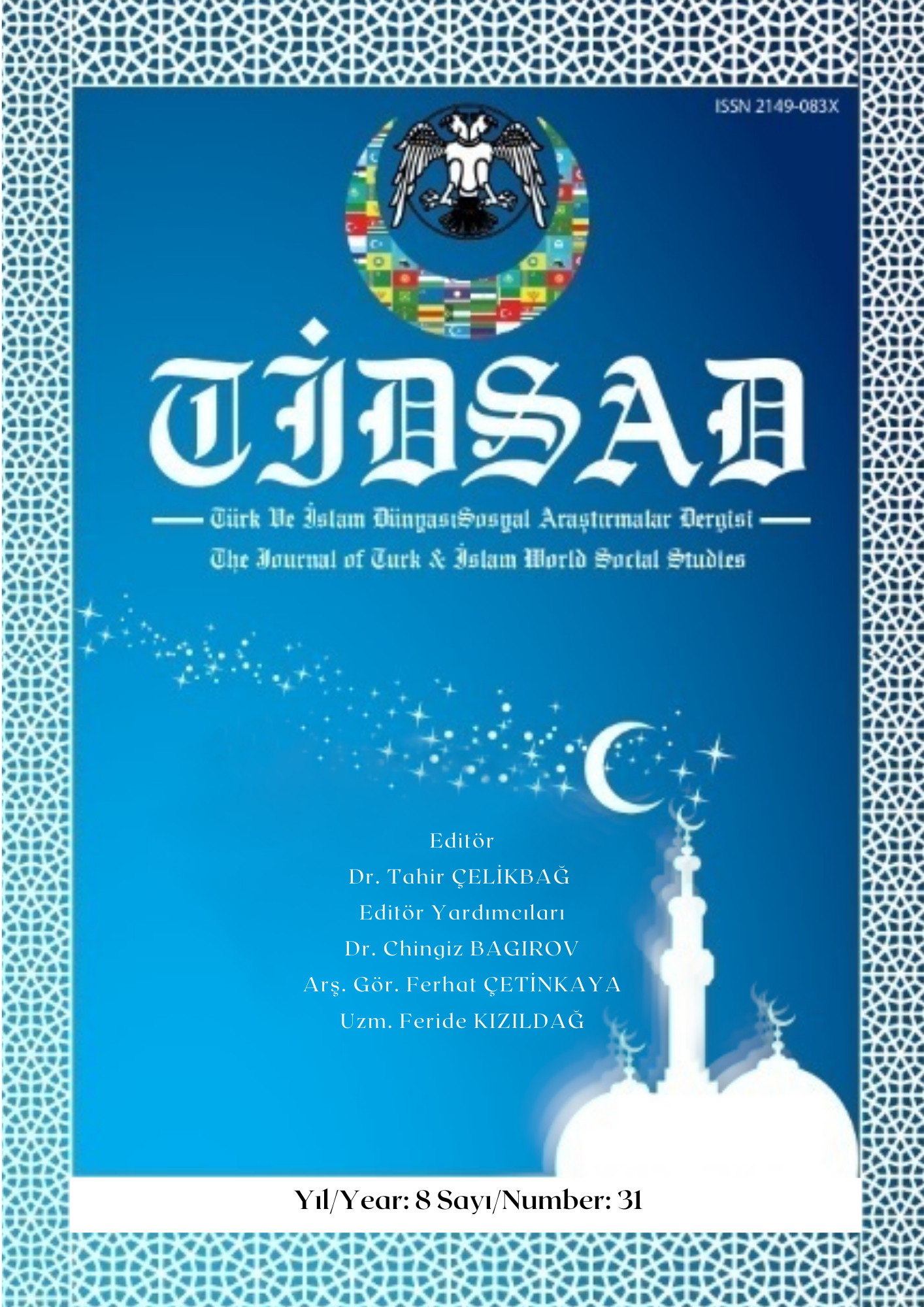Author :
Abstract
Mitolojiye göre, Göktürklerin ataları demircidir. Türkler için demir kutsaldır ve demircilik, en saygın meslek dallarının başında gelmektedir. Ergenekon Destan’ında yer alan kurtarıcı demirci motifinin kökleri oldukça eski çağlara dayanır. Türklerin zihinsel algısında "Gökyüzü Tanrısı" anlayışının merkezinde bulunan demir, Tanrı'nın özüdür. Tarih boyunca demir, insanların korunma, savunma ve barınma gibi doğal ihtiyaçlarını karşılamak için değerli bir elementtir. Türkler tarafından, demirin silah ve diğer aletler yapılmasında kullanılmasının yanında, hastaları iyileştirmek, doğal olaylara cevap vermek, insanları kötü ruhlara ve kötülüğe karşı korumak gibi sembolik özelliklere sahip olduğuna inanılmaktadır. Demirle ilgili her şey toplumların hafızalarda canlıdır ve demirciler de toplumların ortak kültürel değerleri hakkındaki algı ve tasarımlarını taşıyan kişiliklerdir. Yarım asır önce şehirlerimizde, geçmişte her köşe başında rastlanan demirci atölyeleri, son yıllarda büyük oranda azalmıştır. Günümüzde iletişim hızının etkisiyle, özellikle ürün pazarlama ve ticarette küresel dünya kare bir dünyaya dönüşmüştür. Bu dönüşümle birlikte teknolojik araçların ve seri üretim tekniklerinin kullanımı sonucunda soğuk demircilik gelişmiş fakat tarıma dayalı sıcak demircilik önemini kaybetmiştir. Bu değişimlerin sonucunda, sıcak demircilik sektöründe faaliyet gösteren ustaların çoğu meslek hayatını sonlandırmış ve bazıları endüstriyel kalkınmanın etkisiyle sektör değiştirmiştir. Bu çalışmada, Türklerde kutsal değeri olan sıcak demircilik ve Anadolu’daki günümüz demirciliğinin sorunları ve çözüm önerileri sunulmuştur.
Keywords
Abstract
According to mythology, the ancestors of the Göktürks were blacksmiths. For Turks, iron is sacred and blacksmithing is one of the most respected professions. The roots of the savior blacksmith motif in the Ergenekon Epic go back to ancient times. Iron, which is at the center of the understanding of "God of the Sky" in the mental perception of the Turks, is the essence of God. Throughout history, iron has been a valuable element for meeting people's natural needs such as protection, defense and shelter. By the Turks, In addition to being used in making weapons and other tools, iron is believed to have symbolic properties such as healing the sick, responding to natural phenomena, protecting people against evil spirits and evil. Everything about iron is alive in societies' memories, and blacksmiths are personalities who carry their perceptions and designs about the common cultural values of societies. Half a century ago, blacksmith workshops, which were found on every corner in the past, have decreased significantly in recent years. Today, with the effect of the speed of communication, the global world has turned into a square world especially in product marketing and trade. With this transformation, cold blacksmithing developed as a result of the use of technological tools and mass production techniques, but agricultural hot blacksmithing lost its importance. As a result of these changes, most of the masters operating in the hot forging sector have ended their career and some of them have changed the sector with the effect of industrial development. In this study, hot blacksmithing, which has a sacred value in Turks, and the problems and solutions of today's blacksmithing in Anatolia are presented.
Keywords
- Bastem, N.(2019). Türeyiş Destanıyla İlgili Tüm Rivayetlerin Karşılaştırılması ve Kültürel Kodlar Üzerine Bir İnceleme. Atatürk Üniversitesi Türkiyat Araştırmaları Enstitüsü Dergisi, Erzurum, 66, 225-236.
- Çifci, E. (2011). Savaşları Değiştiren 50 Silah At ve Üzengi, http://dunyaharptarihi.com.
- Dıngıl, F. A. (2012). İslam Öncesi Türk Kültüründe Kutsallık İzafe Edilen Maddi Unsurlar. Yüksek Lisans Tezi, T.C. İstanbul Üniversitesi Sosyal Bilimler Enstitüsü, İstanbul.
- Durmuş, İ.(2017). Bozkır Kültür Çevresinde At, Göçer-Ev ve Demir. Asya Araştırmaları Dergisi, 1(1), 19-34.
- Eliade, M. (1992). İmgeler Simgeler (Çev.Ç M. Ali Kılıçbay). Ankara: Gece Yayınları.
- Gömeç, S. (2009). Türk Destanlarına Giriş. Ankara: Akçağ Yayınları.
- İnan, A. (1986). Tarihte ve Bugün Şamanizm. Ankara: Türk Tarih Kurumu.
- Kafesoğlu, İ. (1977). Türk Millî Kültürü. İstanbul: Ötüken Neşriyat.
- Koçak, K. (2016). Bozkır Türk Kültüründe Demirin Ortaya Çıkışı ve İşlenip Yayılması. Tur- kish Studies, 11(1), 77-88.
- Ögel, B. (1991). Türk Mitolojisi (Kaynakları ve açıklamaları ile destanlar), I. Cilt (Tıpkıba- sım) Ankara: Türk Tarih Kurumu.
- Taşağıl, A. (2003). Göktürkler. Ankara: Türk Tarih Kurumu.
- Uğur Çerikan, F. (2014). Türk Kültüründe Demir. Doktora Tezi, Pamukkale Üniversitesi Sosyal Bilimler Enstitüsü, Denizli.
- Yağcı, M. (2015). Türk Kültüründe Demir ve Demircilik (VI-XII. Yüzyıllar). Yüksek Lisans Tezi, Afyon Kocatepe Üniversitesi Sosyal Bilimler Enstitüsü, Afyonkarahisar.
- Ziya Gökalp. (1991). Türk Uygarlık Tarihi. İstanbul: İnkılap Kitabevi.





